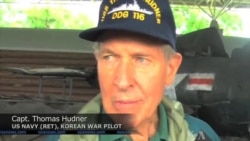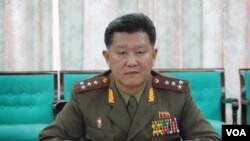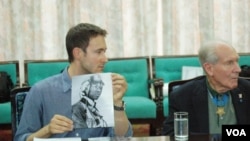An 88-year-old American Medal of Honor winner from the Korean War this week wrapped up an unprecedented trip to North Korea to search for the remains of his wingman, who died after a crash landing in 1950.
Thomas Hudner deemed the trip a success, despite failing to locate Jesse Brown's plane or body.
Brown was the first African-American naval aviator. During the Korean war, he was Hudner’s wingman during sorties they flew off the deck of the USS Leyte aircraft carrier.
The two flew single-engine Corsair (F4U) fighters to provide critical air support for Marines during the Battle of Chosin Reservoir - a pivotal moment in the war.
At a Pyongyang museum, Hudner got to see a similar pair of the planes.
“It's a little difficult to recognize them in the condition they are in,” Hudner remarked. “It brings back old memories, especially that day on the slope in North Korea.”
On that day, Hudner crash-landed his plane after Brown’s went down. It was ultimately a futile attempt to free a dying Brown from his crumpled cockpit -- an act for which Hudner won the Medal of Honor.
Joining Hudner on the July trip to North Korea was Silver Star recipient Dick Bonelli, a Marine who was eight kilometers from the slope where Hudner and Brown brought down their planes on December 4, 1950.
The group arrived in Pyongyang in July hoping to join an expedition to the mountain where Brown’s plane went down. But after their arrival, North Korean military officers explained there would be no visit to the Chosin reservoir because of heavy monsoon-season flooding.
The consolation message: leader Kim Jong Un is aware of their quest, making a return trip more likely.
Hudner said his trip to the isolated country is not merely a quest to retrieve his wingman's remains.
“The more cooperation we get from former enemies, the better off the world will be,” he explained. “We've done this with a number of countries who have been bitter enemies of ours [e.g. Germany and Japan] and they turned out to be some of our strongest supporters.”
The United States and North Korea signed an armistice in 1953 but there has never been a peace treaty.
The militaries of the two countries have cooperated in the return of war dead but a U.S. Defense Department $14 million planned field operation to Chosin and another site was suspended last year as tensions worsened between Washington and Pyongyang.
North Korean officers, at a final meeting with Hudner, asked for his team to return with the U.S. military's forensic experts from the Joint POW/MIA Accounting Command.
The Korean People's Army officers explained that American officials should not delay a resumption of the joint operations since construction of hydroelectric plants and rezoning are increasingly displacing human remains from the three-year war.
They also warned U.S. journalists not to imply North Korea agrees to such operations for financial benefit or to improve bilateral relations.
“Recovering the remains is a humanitarian issue. It is far from a political matter,” explained Senior Col. Pak Gi Yong from the KPA's Panmunjom mission. “We'll do our best to search for and excavate the remains of Jesse Brown.”
Author Adam Makos, who is writing a book about Hudner and Brown's story, lamented the flooding that prevented the Americans from reaching the crash site.
“We were disappointed we couldn't accomplish our mission fully but we were able to hand off the mission to our new friends from the other side,” said Adam Makos, who is writing a book about Hudner and Brown's story. “The KPA officers are going to resume the search this fall with us or without us and that's the outcome we came for - to bring Jesse home. It doesn't matter if it's us or them.”
Hudner, prior to departing North Korea, told officials he would report about his unusual trip to U.S. Secretary of State John Kerry, who is also a former Navy officer.
VOA Correspondent Steve Herman accompanied Hudner to North Korea where they spent nine days in the reclusive country
VOA Correspondent Steve Herman accompanied Hudner to North Korea where they spent nine days in the reclusive country








